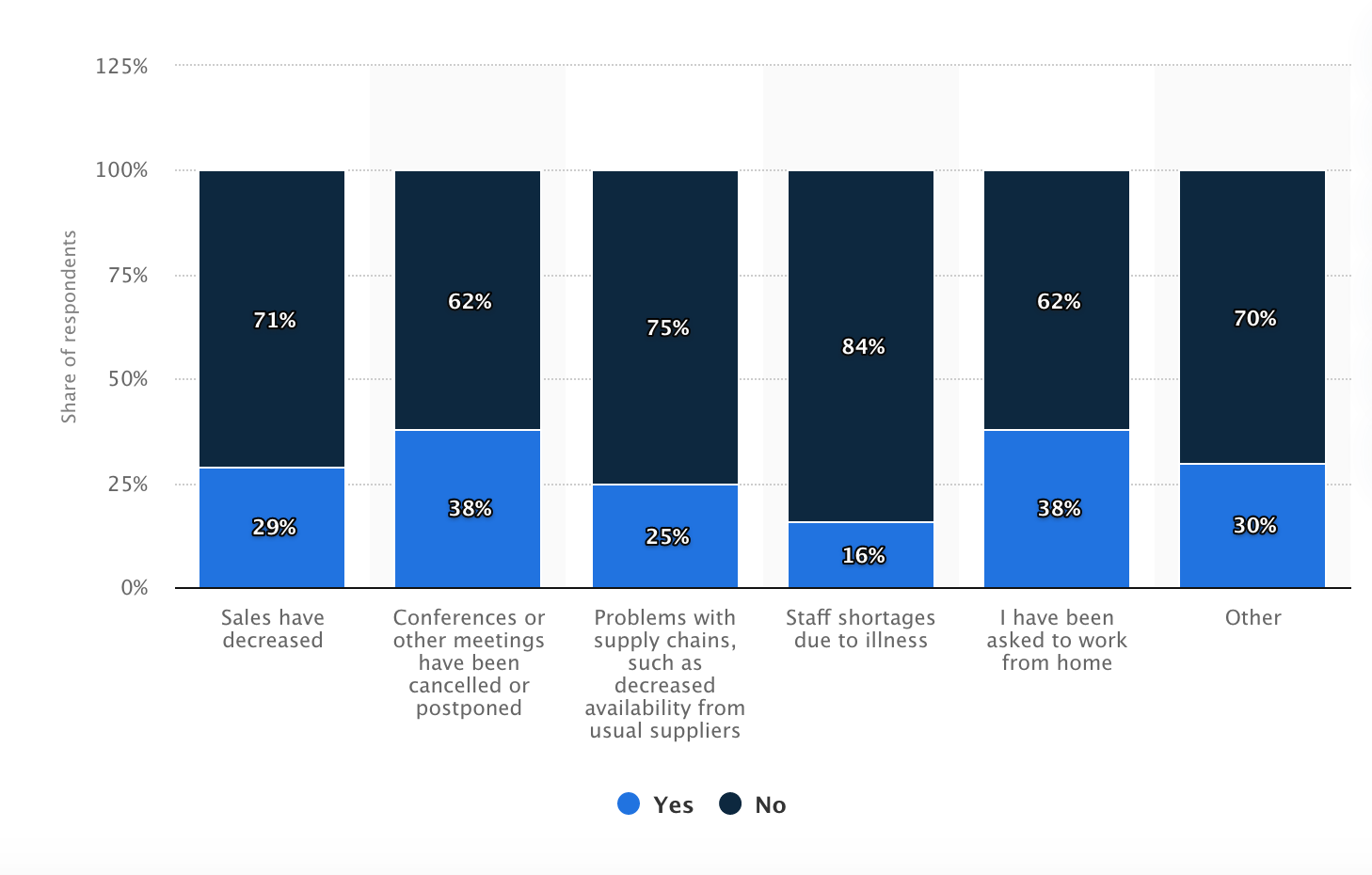Tough times are coming. A big crisis caused by the outbreak of COVID-19 is spreading around us. Experts agree that we are witnessing only the first stage of early recession. The difficult economic situation in the world affects many industries and companies and it may also come to you. It is worth preparing yourself and being ready. How to do it? We’ve collected a set of best practices to help protect your business during a crisis.
The COVID-19 impact on your business
Only a few industries will painlessly go through the coronavirus pandemic crisis. Which ones? This group will surely include e-commerce companies that will be able to quickly adapt to the new reality and attract customers. Furthermore, the technologies that make it easier for employees to work remotely and for people to spend their free time will increase in importance.
Unfortunately, the crisis will hit most companies around the world. The travel industry is already suffering greatly as air traffic in most countries has either been stopped or severely restricted. The situation is also problematic for companies that based their business profile on direct contact with the customer.
The market situation is dynamic. I watch this phenomenon with great curiosity. The United State market is one of the most affected by the crisis. Unemployment is rising there, companies are holding back investments and cutting costs. Entrepreneurs must respond quickly to prepare their businesses for the impending crisis.
In recent days, statista.com has conducted an interesting survey that shows how companies in the U.S. react to the spreading pandemic (as of 24/03/2020).

source: statista.com
Of course, the U.S. is not alone in this difficult battle. European and other markets are also facing challenges. You need to react quickly to prepare your business for the problematic times ahead.
To this end, we want to share our thoughts on how you can protect your business and minimize the impact of the crisis. We’ve collected seven important practices that will help you save your company.
Tips for Business Leaders
Arrange remote work
It seems that remote work will be with us for quite some time. For the sake of employees’ health, companies may allow their employees to return to the offices for a long time. Besides, experts agree that, after the crisis caused by COVID-19, the importance of remote work will increase significantly. So, it is advisable to develop a work system and plans that will ensure unchanged effectiveness of both your employees and your business. Consider the potential dangers of remote work and think about solutions.
In addition, it is worth knowing that remote work, despite appearances, can also be beneficial. If you organize the whole process in a smart way, you will be able to reduce the administrative costs of running your office. Everything is in your hands.
Be smart to keep your business safe
In these difficult times, you should focus on those activities that bring real profit to your business. Temporarily give up on tasks and responsibilities that don’t generate results here and now. You and your whole team must act smart. Some decisions will not be easy, but the crisis is a specific circumstance. If you survive it, your business will become stronger.
Reduce costs
Look for savings. Yes, I know it’s not that easy. However, it is important to make sound business decisions and many companies decide on such a strategy. Optimizing costs will improve your budget, especially in the long run.
When the economy is in good shape and our own business develops, it is easy to spend money and incur liabilities. As long as everything is going well and our company is flourishing, problems are bypassed. However, it is worth considering whether we use the opportunities today to prepare for the difficulties of tomorrow.
Which costs do I refer to? All that do not have a direct impact on the development of your business (revenues). It would be ideal if you could manage to achieve savings of 10% and even 20%. It’s best to start by reviewing the fixed costs, which are probably the biggest burden. Everything, of course, depends on the specifics of your business.

Customer diversification
It may be too late for it now, but it a good point to draw conclusions for the future. Basing more than half of your revenues on one customer can be a problematic strategy under such circumstances. You should, of course, care for the relationship with the largest customers, but you cannot forget about the smaller ones, perhaps those less profitable. They can help your business survive the crisis.
If you rely on one large customer only, his resignation or a significant reduction of the cooperation can be deadly for your business. Remember this for the future.
Take care of your products/services
Provide your clients with the highest quality services/products. It doesn’t matter what kind of business you run. Take care of quality in these difficult times and prove that the crisis has no effect on the values you stand by.
If you sell a specific product, try to convince your customers that they really need it and should not give it up in difficult economic conditions. Furthermore, if you sell specific services, show that you are effective. Be creative. Nobody says it will be easy, but the situation is difficult and requires dedication and analytical work.
Take care of contacts with customers
It’s one of the most important things you can’t forget about. Maintaining good business relationships with clients who provide revenue and stability for your business is crucial. You have to be a real partner for them and try to meet their needs. Show that you care about fruitful cooperation. Show interest. It doesn’t matter if you provide specific services or offer your product, take cake care of your relationships.
Attend to your company’s image
Although the situation is difficult, you cannot forget about constant communication and image building. Don’t focus on forms of sales, because who is thinking about them now? Build your own expertise. Show your company in a good light. Let others see that your company copes well with the growing crisis. And, after it ends, you can benefit from this strategy.
Don’t let the crisis happen!
I know that times are not easy, and we must be ready for many months of a hard fight. However, I am convinced that, thanks to informed business decisions, you will help your company survive this difficult time. It won’t be a road without obstacles, but you can’t give up. I keep my fingers crossed for you!
Read more:
– Why do software projects fail? Most common reasons
– E-commerce: New state of the game 2020 (report)
– Shopify, Spree or Solidus? Check why Ruby on Rails can help you develop your e-commerce







